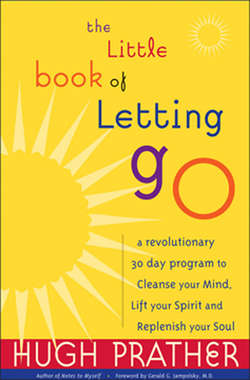Читать книгу The Little Book of Letting Go - Hugh Prather - Страница 24
На сайте Литреса книга снята с продажи.
Younger Brother
ОглавлениеWhen we were in our late teens, my brother and I were invited to visit a ranch in the mountains of Colorado. One day when we were hiking, we came across a magnificent waterfall almost two hundred feet high. I dared my brother to climb it with me and he accepted the challenge.
Our plan was to climb beside the flow of water, and although we didn't have climbing equipment, the grade seemed mild enough that we didn't think we needed it. As often happens with inexperienced climbers, what doesn't seem steep from below seems impossibly steep once you are on the slope. By the time I saw that this was turning out to be more difficult and dangerous than I had guessed, I realized that it would be even more dangerous to attempt to climb back down.
We were about thirty to forty feet from the top, just below a huge rock outcropping, when it started to hail. Soon the hail turned to rain. I could see no way to the top from my side of the outcropping; ordinarily I would have circled around to my brother's side, but suddenly the shale we were standing on began loosening.
Being the oldest of the two and the one who had made the dare, I was in the lead. As our footing began to wash out from under us, I became worried. The longer I stood there thinking of the disastrous consequence each option before me could bring, the more my muscles tensed up. My brother chose that moment to tell me that he had heard that climbers had died attempting to scale this fall on two occasions. Hearing that, I froze completely. I literally could not move an inch.
Despite my frozen state, I could still talk. I assured my brother that from where I was standing, I could see a way to the top from his side of the outcropping. This was a lie but it was the only thing I could think of that might get us off what was slowly becoming an avalanche. Fortunately, my guess turned out to be right, and when he climbed to the top, he reached down and helped me up.
A natural reaction to this story would be to say that I worried at the wrong time. If I had worried before we started to climb, maybe we wouldn't have gotten ourselves into danger. Clearly a rule such as “Worry before but not during” won't work. That rule would have made me question accepting the invitation to visit the ranch, question the thought of taking a hike in unfamiliar terrain, and so on. Often it isn't even clear what point is the beginning.
When is the right time to worry? Our plan could have been to climb part way up the falls just to see what the view was like. If that had been the thought, should we have applied the rule “before but not during”? Actually, there were several points along the way when it still would have been safe to go back. Should we have worried about finding and acknowledging the exact no-turning-back point? If we agreed that this point had been reached (people seldom agree when to stop), should we have paused and worried then? During the climb, we saw a snake that neither of us had seen before and we inched closer to get a good look. Should we have worried before we started the inching or at the point we stopped to look?
Obviously there is no formula for the right time to worry. Perhaps it could be said that “a little worry” is a good thing. Perhaps it's the amount and not the time that's important. Maybe if I had worried a little we wouldn't have ended up in life-threatening circumstances. Yet the fact that the climb looked worrisome made the thought of doing it exciting. Who would dare someone to climb a wide, gentle slope covered with a thick cushion of grass? If we hadn't been “a little worried,” the climb wouldn't have been a challenge. It seems that I needed to worry more than I did, but how much more? Obviously I worried “too much” when I stood below the outcropping.
The thought that there is an exact amount of worry needed is just something more to worry about. Once again, no formula exists that will indicate the degree of worry needed. The fact is worry begets worry; and neither its time nor degree can be controlled, nor can its effects be foreseen. Worry doesn't work.
